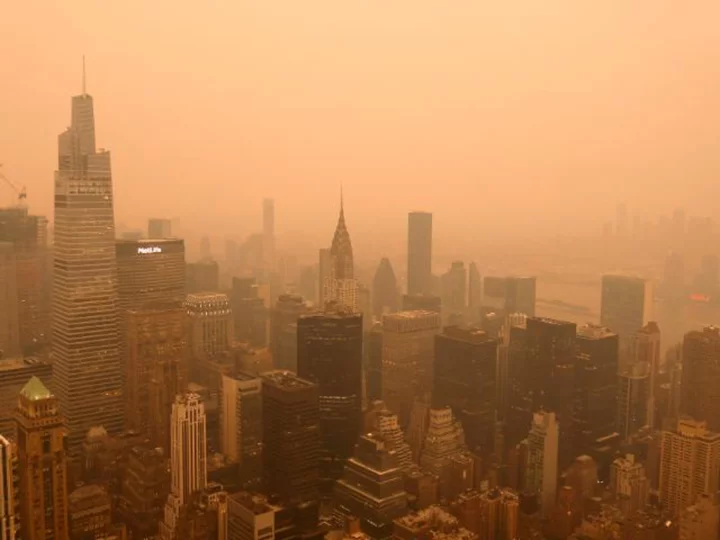As an orange haze of wildfire smoke from Canada smothers parts of the eastern US, officials are warning residents in both countries of unhealthy or hazardous air Wednesday.
More than 55 million people in the eastern US are under air quality alerts due to the smoke. The heaviest smoke is forecast to impact the Northeast through the Mid-Atlantic and down to the Carolinas, and smoke conditions in those regions could last through at least Thursday.
And the Canadian capital of Ottawa is getting hit with some of the worst air quality, according to AirNow.gov, a partnership of the US Environmental Protection Agency, the National Oceanic and Atmospheric Administration, the US Centers for Disease Control and Prevention and other agencies.
While New York City, Philadelphia and Washington, DC, are expected to see their air quality improve throughout the day, the air over Boston, Pittsburgh and Raleigh, North Carolina, is expected to get worse Wednesday.
LIVE UPDATES ON SMOKE'S SPREAD
New York City had the worst air pollution of any major city in the world at one point Tuesday night, before dropping to second-worst behind New Delhi, India, according to air quality tracker IQair.
The smoke has also triggered air quality alerts in parts of Massachusetts, New Hampshire, Pennsylvania, Maryland, Virginia and the Carolinas, according to the National Weather Service.
Air quality in the US Northeast has deteriorated this week as more than 150 wildfires rage in Quebec, according to the Canadian Interagency Forest Fire Center.
In Quebec, the entire town of Chibougamau -- population 7,000 -- is under a mandatory evacuation order as fast-moving wildfires wreak havoc across the region.
"Given the current situation, the mayor of Chibougamau, Manon Cyr, has declared a state of emergency and announced the mandatory evacuation of the entire town, including the resort area," the town announced in a Facebook post Tuesday night.
So far this year, the province has experienced more than 400 wildfires, which is twice the average for this time of year.
More than 9 million acres have been charred by wildfires in all of Canada this year -- about 15 times the normal burned area for this point in the year.
The alarming air quality prompted New York Mayor Eric Adams to ask residents to limit their outdoor activity and state environmental officials to issue an air quality health advisory for the city through Wednesday.
"Active children, adults, and people with lung diseases such as asthma should reduce prolonged or heavy exertion outdoors," New York City Emergency Management said.
The nation's largest public school district canceled all outdoor activities Wednesday, but will remain open. At least 10 school districts in central New York state canceled outdoor activities and events Tuesday.
Overnight Tuesday into Wednesday, the air quality index for the city topped 200, pushing it into the "very unhealthy" range, according to air quality tracker AirNow. By 7 a.m. Wednesday, New York City's air quality index was just below 180, a designation of "unhealthy."
Human-induced climate change has exacerbated the hot and dry conditions that fuel wildfires. Scientists recently reported that millions of acres scorched by wildfires in the Western US and Canada -- an area roughly the size of South Carolina -- could be traced back to carbon pollution from the world's largest fossil fuel and cement companies.
Why wildfire smoke can be hazardous
Wildfire smoke is particularly dangerous because it contains tiny particulate matter, or PM2.5 -- the tiniest of pollutants.
When inhaled, it can travel deep into lung tissue and enter the bloodstream. It comes from sources like the combustion of fossil fuels, dust storms and wildfires, and has been linked to a several health complications including asthma, heart disease and other respiratory illnesses.
And the impacts could be deadly: In 2016, about 4.2 million premature deaths were associated with fine particulate matter, according to the World Health Organization.
"If you can see or smell smoke, know that you're being exposed," said William Barrett, the national senior director of clean air advocacy with the American Lung Association. "And it's important that you do everything you can to remain indoors during those high, high pollution episodes, and it's really important to keep an eye on your health or any development of symptoms."









